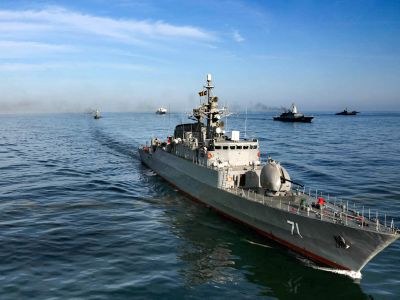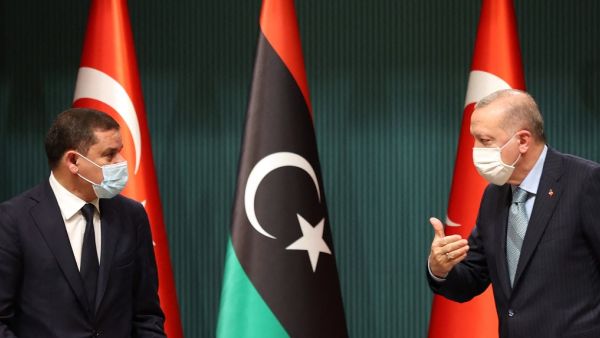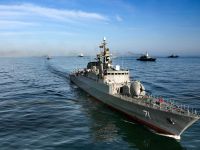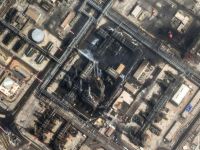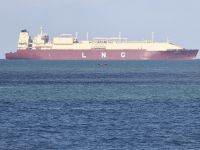Libya’s interim prime minister, Abdulhamid Dbeibeh flew into Ankara Monday with a large delegation that included 14 ministers along with senior military figures. As reflected by the size of Dbeibeh’s accompanying team, the two-day visit at the invitation of Turkish president Recep Tayyip Erdogan is looking at a whole range of issues. While Dbeibah went to talks with Erdogan, Libyan ministers paired off with their Turkish counterparts.
Foremost on the agenda will have been the return of Turkish companies to stalled and unpaid-for former projects as well as the winning of mandates for brand new housing and infrastructure developments.
Turkey’s Trade Minister Ruhsar Pekcan sat down with Libya’s Economy and Trade Minister Mohamed Hwej and Planning Minister Fakher Muftah Bufarna. Pekcan said afterwards, according to Turkish daily Hurriyet, that she was confident that Turkey would continue to cooperate with Libya in all areas, including industry and infrastructure investment as well as health, energy and banking.
Outstanding discussion with Foreign Minister @NikosDendias today. We strongly support Greece’s stabilizing role in the region, including through the ongoing exploratory talks with Turkey, support for a sovereign and prosperous Libya and enhanced engagement in the Western Balkans. pic.twitter.com/WgAMwUkEcP
— Geoffrey Pyatt (@USAmbPyatt) April 13, 2021
In 2020, the previous Libyan government of Fayez Serraj signed an agreement with Ankara to complete 184 stalled Turkish construction projects in Libya estimated at US$ 16 billion.
Meanwhile Turkish Energy and Natural Resources Minister Fatih Donmez took to social media to describe his talks with Libyan Oil and Gas Minister Muhammad Aoun as “fruitful” adding “ We have decided to develop our cooperation, especially oil and natural gas”.
In the hotly-disputed 2019 Turkish-Libyan maritime boundary deal, Turkey challenged the claims of Greece, Cyprus and Egypt to waters in the eastern Mediterranean. While Turkey acted to send an exploration rig and prepared to shoot seismic surveys beneath the ocean bed, the agreement signed by the former Libyan government opened up no immediate exploration horizons for Libya, whose relatively limited offshore production is confined to the Gulf of Sirte. There the country’s National Oil Corporation (NOC) is in partnership with Italy’s Eni.
Moreover, Serraj dispensed with an oil ministry and left the running of the country’s hydrocarbon production in the hands of the NOC and its technocratic chief Mustafa Sanalla. Dbeibeh has revived the ministry.
Libya’s Industry and Minerals Minister Ahmed Omar and Higher Education and Scientific Research Minister Imran Al-Qeeb meanwhile linked up with Turkish Industry and Technology Minister Mustafa Varank.
Afterwards Varank said that Libya’s potential, particularly in industry, mining and entrepreneurship, should be pushed forward. He emphasised that the two sides would maintain close cooperation.
“A very different world awaits Libya with elections at the end of 2021. In the new era, we must unlock Libya’s potential together,” Varank told Hurriyet.
There were also meetings between Libyan foreign minister Najla Mangoush and her opposite number Mevlut Cavusogly and finance minister Khaled Abdulah and his Turkish counterpart Lutfi Elvan.
There were no reports of any military discussions. Dbeibeh’s UN-backed government has been insisting that all foreign forces should withdraw from Libya. The premier himself described their presence as a knife in his country’s back.
Turkey and Libya renew their commitment to a controversial maritime deal that has angered Greece and Cyprus https://t.co/Nb60FSqHaa pic.twitter.com/f5SfYLPQsI
— Al Jazeera English (@AJEnglish) April 12, 2021
While the Russian military surrogate, the Wagner Group has had fighters backing eastern Libyan strong man Khalifa Haftar, Turkey had provided the rival west of the country with weaponry, particularly armoured cars and drones as well as Syrian mercenaries. It has also been developing the Wattiya airbase in the west of the country as an alternative to its original military transhipment point at Misrata airport.
Dbeibeh and Erdogan are due to chair the first meeting of the Turkey-Libya High Level Strategic Cooperation Council in Ankara.
“At the Council Meeting to be held with the participation of relevant ministers,” said a Turkish government statement, “all aspects of Turkey-Libya relations, which have deeply-rooted, historic ties, will be discussed, steps that can be taken to further improve cooperation will be evaluated”.
This article has been adapted from its original source.


